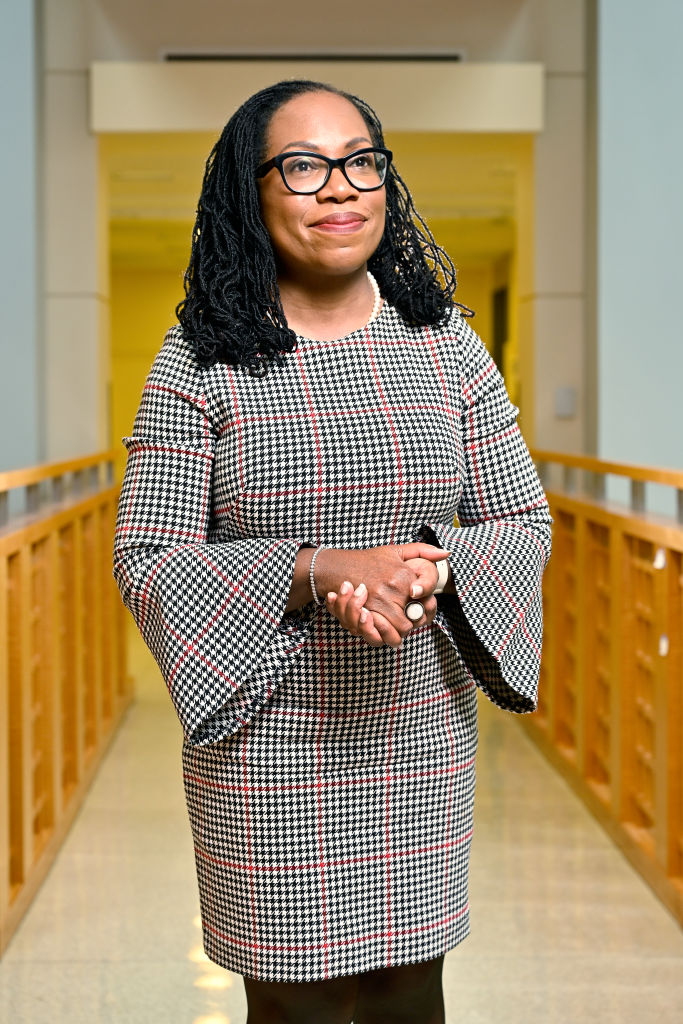
Source: The Washington Post / Getty
Ketanji Brown Jackson was sworn in today as the 116th Supreme Court justice. She is the first Black woman and only the third Black person to ever sit on the highest court in America.
Jackson is also the first former public defender to join the Court. She fills a gap left after Justice Thurgood Marshall retired in 1991, bringing the perspective of someone who has done indigent defense back to the bench.
The 51-year-old is the second-youngest member of the Court, behind Justice Amy Coney Barrett who is 50.
Justice Jackson joins a Supreme Court that is majority conservative-leaning just a week after the court overturned Americans’ constitutional right to abortion in a landmark ruling that polling shows go against the will of more than two-thirds of the country’s citizens.
The 6-3 decision — which was led by Justice Samuel Alito, who was accompanied by the five other conservative-leaning Supreme Court Justices — ends the legal right to an abortion after the nearly 50 years since Roe v. Wade determined in 1973 that American women had the constitutional right to make their own decisions about terminating pregnancies.
In February, President Joe Biden nominated Jackson to replace the retired Justice Stephen Breyer, for whom she served as a law clerk years ago.
Biden pledged during his campaign to nominate the first Black woman justice to the U.S. Supreme Court.
“It has taken 232 years and 115 prior appointments for a Black woman to be selected to serve on the Supreme Court of the United States, but we’ve made it! We’ve made it — all of us,” said Jackson during her speech at the White House after her confirmation.
In April the U.S. Senate voted to confirm Jackson in a 53-47 vote. Sens. Susan Collins, Lisa Murkowski, and Mitt Romney were the only three Senate Republicans who voted to confirm. All three senators made it clear that they don’t always agree with Jackson’s ideas but said she was extremely qualified, which outweighed the differences in beliefs.
Republicans’ relentless attacks during her confirmation
But the rest of the GOP senators used the nomination hearing as an opportunity to discredit Jackson, as well as push their racist conservative agendas.
On day one of Judge Ketanji Brown Jackson‘s Supreme Court confirmation, republican senators attacked her character and qualifications.
Sens. Marsha Blackburn and John Cornyn spent part of their statements positioning Jackson as someone who worked opposite the law instead of upholding it. Blackburn insinuated that Jackson would go easy on allegedly violent criminals because of her background, echoing a ridiculous claim by Sen. Josh Hawley about Jackson and supporting “cop killers” and “child predators.”
Cornyn all but called Jackson, a terrorist sympathizer by claiming her representation of those detained at Guantanamo Bay. Jackson would not be the first lawyer to advocate for people having due process rights. Detainees previously were determined to have some rights to pursue grievances in U.S. Courts. Last year, the American Bar Association filed an amicus brief arguing that some due process rights are available to detainees.
During several points of the hearing, notably in Jackson’s exchanges with Sens. Tom Cotton and John Kennedy, the judge repeatedly declined to engage in hypotheticals about policy matters not suitable for a Justice to discuss. Cotton kept asking questions based on generalizations and out-of-context data points concerning crime and policing, questions that have nothing to do with Jackson and everything to do with scoring points with the November electorate.
During her exchange with Cotton, Jackson had to remind him that Congress, not the Supreme Court or other federal judges, was responsible for the issues in question. Also, questions like should we have more police are for local communities and their residents to decide, not a judge.
The GOP also took the opportunity to push false information on critical race theory.
Jackson has inspired HBCU Law School students
The confirmation of Ketanji Brown Jackson to the United States Supreme Court was a moment of triumph for nearly every Black person in this country.
The joy that exuded from our community when her confirmation became official was beautiful but it probably paled in comparison to the validation, inspiration, and motivation that it gave to Black Law School students across the nation, especially the ones attending historically Black colleges and universities (HBCUs).
“It was such an inspiring moment it reminded me of when President Barack Obama was elected to the presidency. I had that same pride, passion, and exuberance,” Edrius Stagg, a third-year part-time evening division Law Student at Southern University Law Center told NewsOne in an exclusive. “Those things that we have heard KBJ do throughout her career, Black women have been doing that for the entirety of the time I have been living. They haven’t been given the necessary just due for the things that they can accomplish oftentimes in the shadow of men.”
SEE ALSO:
Justice Ketanji Brown Jackson Sworn In As First Black Woman On The Supreme Court was originally published on newsone.com
















